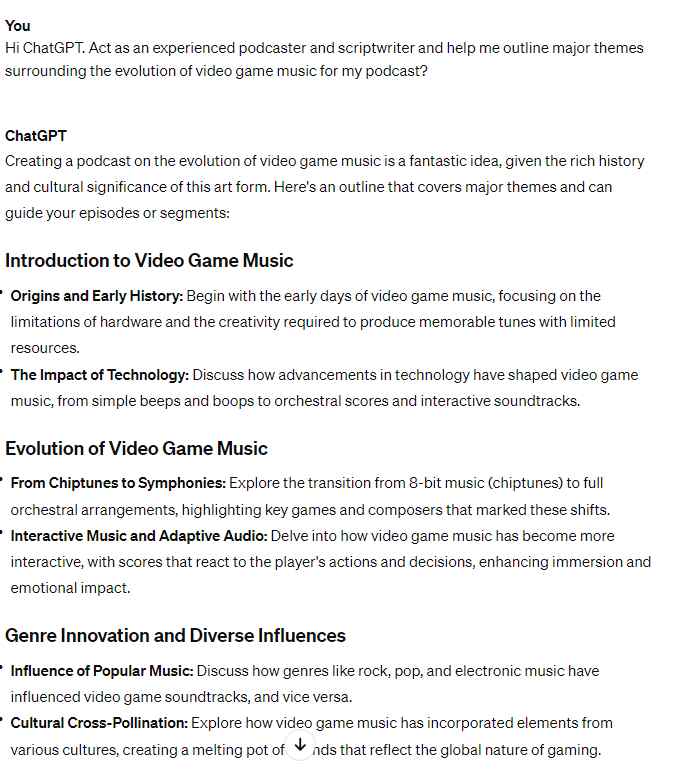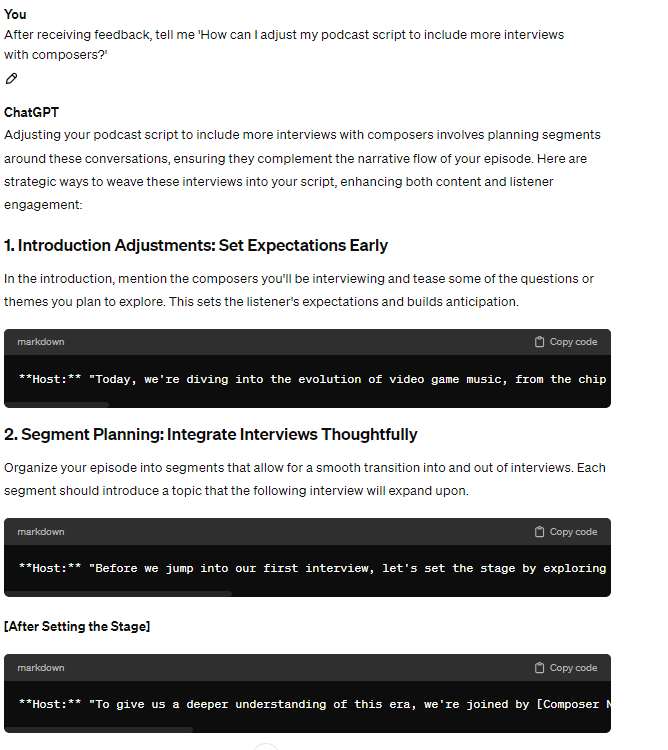In today’s fast-evolving podcasting landscape, best AI writing tools have emerged as a game-changer, allowing creators to produce more engaging, nuanced, and listener-focused content than ever before.
The integration of AI writing tools into podcast scriptwriting, particularly in mastering how to write engaging podcast scripts with AI writing tools, streamlines the creative process and introduces a level of precision and personalization that was previously unattainable.
This evolution is especially pertinent in an increasingly competitive podcast industry, where success often depends on the ability to distinguish oneself through superior quality and engagement.
How to Write Engaging Podcast Scripts with AI Writing Tools ? – Step-By-Step Guide
Crafting a podcast script that engages your audience from start to finish requires a blend of creativity, research, and strategic structuring. AI writing tools, like ChatGPT, offer a transformative approach to this creative process.
Below, we delve deeper into each step of crafting engaging podcast scripts using AI tools, maintaining the practical example focused on developing a podcast about the evolution of video game music.
Step 1: Define Your Podcast’s Theme and Objectives
The foundation of any great podcast is a clear, compelling theme and well-defined objectives. This initial step involves pinpointing exactly what you want to achieve with your podcast and identifying your target audience. Understanding these elements guides the AI in generating content that aligns with your vision and resonates with your listeners.
Practical Example:
“I asked ChatGPT, ‘Can you help me outline major themes surrounding the evolution of video game music for my podcast?’ This initial query is crucial as it directs the AI to focus on generating content that aligns with the specific theme of video game music evolution.

Step 2: Conduct Research Using ChatGPT
Thorough research is pivotal to creating content that is not only engaging but also informative and credible. At this stage, AI tools can be leveraged to gather comprehensive information on your topic, including historical insights, current trends, and expert opinions. This step ensures your podcast is grounded in accurate and up-to-date information.
Practical Example:
“Continuing with our podcast theme, I ask ChatGPT, ‘What are key milestones in the evolution of video game music?’ The AI compiles a detailed account, which will enrich the podcast with authoritative content.

Step 3: Create a Script Outline with ChatGPT
Structuring your podcast with a detailed outline is key to ensuring a coherent and engaging narrative. This step involves using AI to map out the episode structure, including the introduction, main body segments, transitions, and conclusion. A well-thought-out outline serves as a blueprint for your script, guiding the flow of information and maintaining listener engagement throughout the episode.
Practical Example:
Based on gathered information, I request, ‘Draft an episode outline focusing on the transition from chiptunes to orchestral music in video games.’ ChatGPT’s outline organizes the episode into a logical flow, ensuring comprehensive coverage of the topic.

Step 4: Write the Script Using ChatGPT
With a solid outline in place, the next step is to expand it into a detailed script. This involves fleshing out each segment with engaging dialogue, descriptive narration, and smooth transitions. AI tools can help transform your outline into a compelling script that captures the essence of your podcast theme and keeps your audience hooked.
Practical Example:
“With the outline ready, I say to ChatGPT, ‘Write a detailed script for the outlined episode on video game music evolution.’ The AI generates a script that’s rich in content and engaging for listeners.

Step 5: Edit and Refine with ChatGPT
Editing and refining your script is crucial for enhancing its quality, coherence, and overall listener appeal. This step involves revising the AI-generated script to improve its flow, clarify complex points, and inject your unique voice and style. AI can suggest edits for better clarity and engagement, but personal touches are what truly make your podcast stand out.
Practical Example:
To polish the draft, I ask ChatGPT, ‘Edit this script to enhance listener engagement and ensure the narrative is cohesive.’ The AI’s revisions make the script smoother and more dynamic.

Step 6: Integrate Feedback Using ChatGPT
Listener feedback is invaluable for improving your podcast. This step focuses on analyzing feedback to identify areas for improvement and adjusting your content strategy accordingly. AI can help synthesize feedback and suggest actionable changes to better meet your audience’s needs and preferences.
Practical Example:
After receiving feedback, I consult ChatGPT: ‘How can I adjust my podcast script to include more interviews with composers?’ This iterative process ensures the content remains relevant and engaging.

Step 7: Optimize for SEO and Distribution with ChatGPT
Maximizing the reach of your podcast involves optimizing it for search engines and distribution platforms. This final step uses AI to generate SEO-friendly titles, descriptions, and tags that enhance discoverability. Effective SEO practices ensure your podcast attracts new listeners and grows its audience.
Practical Example:
To extend our podcast’s reach, I request, ‘Generate an SEO-friendly title and description for my episode on orchestral music in video games.’ ChatGPT’s suggestions are designed to improve visibility and attract a wider audience.
By methodically applying AI tools for time management at each stage of the podcast scriptwriting process, creators can produce content that is not only engaging and informative but also tailored to their audience’s interests and easily discoverable.
Furthermore, embracing creating SEO content with AI writing tools can significantly enhance the quality and relevance of your podcast’s online presence, making it a go-to resource within its niche.

By methodically applying AI tools at each stage of the podcast scriptwriting process, creators can produce content that is not only engaging and informative but also tailored to their audience’s interests and easily discoverable.
Transformative Impact of AI
Creators leveraging AI tools for scriptwriting have reported up to a 50% reduction in preparation time, alongside noticeable spikes in listener engagement rates. This efficiency gain is attributable to AI’s capacity for analyzing listener data and preferences, enabling the production of content that resonates more deeply and effectively with audiences.
How AI Writing Tools Automate the Entire Podcast Creation Process?
In this article, we will not only discuss how to write engaging podcast scripts with AI writing tools, but also define how AI tools can automate the complete podcast creation process.

AI is reshaping podcast production, transforming it from scriptwriting to post-production. This automation streamlines the creative process, making it more efficient and tailored to audience interests.
Automated research:
By analyzing current trends, social media buzz, and listener feedback, AI identifies subjects that are likely to engage and attract listeners. This ensures that podcast content is not only relevant but also resonates with current interests and news.
Theme suggestions:
Utilizing predictive analytics and historical listener data, AI tools can suggest themes that are most likely to captivate and retain your audience’s attention. This data-driven approach to selecting topics enhances the likelihood of podcast success.
Script outlines:
AI-generated outlines offer a structured approach to episode creation, ensuring that each segment flows logically into the next. This helps in maintaining listener engagement throughout the episode by providing a coherent narrative.
Content tailoring:
AI tools analyze listener demographics and preferences to tailor the script’s tone, style, and complexity. This customization ensures that the podcast speaks directly to the audience, increasing relatability and listener loyalty.
Editing and refinement:
Beyond simple spell-checks, AI provides comprehensive editing suggestions. This includes improving the script’s flow, enhancing clarity, and enriching the content, thereby elevating the overall quality of the podcast.
How AI Writing Tools Enhance the Quality of Podcast Scripts?
The integration of AI into scriptwriting significantly elevates the content quality, making each episode more engaging and professional. This approach is central to how to write engaging podcast scripts with AI writing tools, enhancing the creativity and impact of your podcast episodes.

Narrative and structure:
AI assists in organizing ideas into captivating narratives. By ensuring a logical sequence of thoughts, AI helps keep the audience engaged from start to finish.
Language and vocabulary:
AI’s ability to tailor the script’s language for specific audience profiles means that each podcast episode can strike the right balance between complexity and relatability, humor, and seriousness.
Grammar and syntax:
AI’s advanced language models provide more than just grammar corrections. They offer stylistic enhancements that improve readability and listener comprehension, thereby professionalizing the podcast’s content.
How to Choose the Right AI Writing Tool for Your Podcast?
Selecting an AI writing tool that aligns with your podcasting goals and workflow is crucial for maximizing the benefits of AI in content planning and creation.
As podcasts continue to grow in popularity, creators are constantly looking for innovative ways to streamline their content creation process while maintaining or enhancing the quality of their output.
This is where AI writing tools can play a significant role in generating scripts or content ideas and in AI for creative storytelling to captivate your audience with compelling narratives.

System compatibility:
It’s essential to choose a tool that integrates smoothly with your existing content management and production software to avoid workflow disruptions.
Audience understanding:
Opt for AI tools that offer deep insights into audience preferences and behaviors. This ensures that the content generated resonates well with your listeners.
Support and pricing:
Reliable customer support and clear, flexible pricing models are vital. They guarantee that you can get assistance when needed and understand the costs involved.
Security:
Ensure that the AI tool you select adheres to stringent data protection standards to safeguard your content and listener information.
Quick Checklist for Choosing an AI Writing Tool:

- Identify your podcasting needs: Understand what aspects of your podcast production you want to enhance with AI.
- Evaluate integration capabilities: Ensure the tool can be easily integrated into your existing workflow without significant changes.
- Consider the content genres: Some AI tools specialize in certain types of content or themes; pick one that aligns with your podcast’s focus.
- Test for user-friendliness: A tool with an intuitive interface reduces the learning curve and improves efficiency.
- Assess customization options: The ability to customize the tool’s output is crucial for creating unique and engaging content.
- Review scalability: The tool should be able to support your podcast as it grows in audience size and production complexity.
- Check for content diversity: The best AI tools can generate a variety of content types, from scripts to promotional materials.
- Analyze feedback mechanisms: Tools that offer feedback on content performance can help you continuously improve your podcast.
- Investigate AI learning capabilities: Choose tools that learn from feedback and improve over time for increasingly relevant content suggestions.
- Consider community and support: A vibrant user community and responsive support team are invaluable for troubleshooting and tips.
- Look for trial versions: Testing the tool before committing can help you assess its fit with your podcasting needs.
- Evaluate update frequency: Regular updates indicate a commitment to maintaining high performance and adding new features.
- Research user reviews: Insights from current users can highlight strengths and potential issues with the tool.
- Understand the pricing structure: Ensure the pricing model is sustainable for your budget over the long term.
- Assess data security: The tool should have robust security measures to protect your content and listener data.
Choosing the right AI writing tool involves a careful assessment of how it will fit into your existing workflow, its ability to meet your specific content creation needs, and its potential to grow with your podcast. Considering these factors, you can leverage AI to significantly enhance your podcast’s quality and engagement.
How to Integrate AI Tools Into Your Podcast Workflow?
Integrating AI tools into your podcast workflow and addressing potential challenges requires a thoughtful approach to leverage the benefits while mitigating the downsides. Here are some strategies for both integration and troubleshooting:

Start Small:
Initiating your journey with AI through a singular tool or feature allows for a manageable learning curve. This focused approach helps you gauge the tool’s impact and ease the integration process, ensuring a smoother transition for your podcast production team.
Brainstorming Support:
AI’s capability to sift through vast amounts of data can be a boon for generating fresh content ideas. By leveraging AI for brainstorming, you can uncover new topics and themes that resonate with current trends and audience interests, enriching your podcast’s content diversity.
Feedback Loop:
Integrating listener feedback into the AI refinement process is crucial for aligning content with audience expectations. This iterative feedback mechanism ensures your content evolves in response to listener preferences, enhancing engagement and satisfaction.
Iterative Implementation:
The gradual introduction of AI tools and features allows for an assessment of their impact on your workflow and content quality. This step-by-step approach facilitates a more controlled adaptation, enabling you to make informed decisions about further AI integration.
Collaboration Between AI and Human Creativity:
The synergy between AI-generated content and human creativity enriches your podcast, ensuring it retains a unique and relatable touch. This collaboration brings together the best of both worlds, leveraging AI’s efficiency and human creativity’s depth.
What’s Next for AI in Podcasting?
The future of podcasting with AI, especially on mastering how to write engaging podcast scripts with AI writing tools, promises not only personalized content but also advanced voice synthesis, interactive episodes, and immersive AR/VR experiences. This innovative approach elevates the listener’s experience by integrating cutting-edge technology with creative storytelling techniques.

1. Enhanced Personalization through AI
AI’s evolving capabilities are set to offer unprecedented personalization in podcasting, tailoring content to individual listener preferences.
- Deeper Understanding of Preferences: Future AI systems will leverage sophisticated algorithms to deeply understand individual listener preferences, analyzing listening habits and feedback to tailor content recommendations more accurately.
- Dynamic Content Adaptation: AI will dynamically adapt podcast content, adjusting topics, and presentation styles based on listener behavior and preferences, making each podcast episode more relevant and engaging to each listener.
- Predictive Content Curation: Leveraging predictive analytics, AI will not only recommend existing podcasts but also suggest upcoming content and themes likely to interest listeners, keeping them engaged and anticipating future episodes.
2. Advancements in Voice Synthesis Technology
Innovations in voice synthesis are poised to create more realistic and diverse audio experiences, enhancing the global appeal of podcasts.
Realistic Voice Generation:
Upcoming breakthroughs in voice synthesis technology will enable the creation of highly realistic and diverse voice characters, making podcasts more engaging and inclusive.
Multilingual Content Creation:
AI-driven voice synthesis will facilitate seamless content creation in multiple languages, significantly broadening the global reach of podcasts by making them accessible to a wider audience.
Emotional Range Expansion:
Future voice synthesis improvements will include the ability to convey a broader range of emotions and tones, enhancing the storytelling aspect of podcasts and making content more relatable.
3. Interactive Podcast Episodes
AI is transforming podcasts into interactive experiences, allowing listeners to influence narratives and engage with content in novel ways.
Branching Narratives:
AI will enable the creation of podcasts with branching narratives, where listeners can choose different paths, leading to multiple story outcomes, offering a personalized storytelling experience.
Listener-Driven Content:
Through AI, podcasts could incorporate real-time listener feedback and choices, dynamically altering the content or direction of the episode based on audience participation.
Enhanced Engagement Tools:
AI will introduce new tools and platforms that facilitate interactive elements within podcasts, such as polls, quizzes, and decision points, further engaging listeners and encouraging active participation.
4. Integration of Augmented Reality (AR) and Virtual Reality (VR)
The integration of AR and VR with AI opens new dimensions in podcasting, offering listeners immersive and educational content experiences.
Immersive Experiences:
The integration of Augmented Reality (AR) and Virtual Reality (VR) with AI in podcasting could lead to immersive experiences, where listeners are not just passive consumers but active participants in a virtual environment.
Enhanced Educational Content:
By combining AI with AR/VR, educational podcasts can become more interactive and engaging, offering simulations and virtual environments for learning and exploration.
5. AI-driven Content Analysis and Improvement
AI tools will revolutionize podcasting by optimizing content in real-time for improved structure, pacing, and overall listener engagement.
Automated Content Optimization:
AI will offer tools for real-time analysis and optimization of podcast content, suggesting improvements in structure, pacing, and engagement to maximize listener retention.
Content Accessibility Enhancements:
AI will play a crucial role in making podcasts more accessible, providing automated transcription, translation, and adaptation services to ensure content is available to everyone, regardless of language or hearing impairments.
These advancements suggest a future where AI not only enhances the production and distribution of podcast content but also transforms the listener experience into something more personalized, interactive, and immersive.
Overcoming Challenges: Troubleshooting Common AI Scriptwriting Issues
Navigating the complexities of AI scriptwriting demands strategic solutions to biases, overfitting, and ensuring content originality and contextual accuracy.
With the evolution of AI technology, the task of maintaining the integrity of generated content has become paramount. One of the hurdles is the authenticity and truthfulness of the information produced by AI systems.
To tackle this, it’s crucial to embrace techniques for fact-checking AI content, which can significantly enhance the reliability of produced scripts. 
Identifying and Correcting Biases:
AI models can unintentionally propagate biases. Regularly auditing the AI’s output and implementing bias-correction mechanisms are crucial for producing fair and inclusive content.
Dealing with Overfitting:
AI models may overfit to specific data patterns, resulting in repetitive content. Incorporating diverse training datasets and fine-tuning the model parameters can mitigate this issue.
Ensuring Originality:
AI-generated scripts risk being derivative. Employing plagiarism checks and tweaking AI parameters to encourage creativity helps maintain the originality of your podcast scripts.
Understanding Contextual Nuances:
AI can struggle with capturing the subtleties of language and context. Continuous training on nuanced datasets and manual review processes can enhance the AI’s contextual understanding.
Managing Expectations:
Setting realistic expectations for AI capabilities and understanding its limitations are vital. Engaging in iterative refinement and collaboration between AI and human writers can significantly improve script quality.
Maintaining Relevance: Continuously Updating AI Models
To keep content fresh and aligned with audience interests, integrating the latest trends and listener data into AI models is essential.
One key aspect of ensuring your AI models produce relevant and engaging outputs is to utilize AI for grammar and clarity, which helps in refining the content to meet high-quality standards.

Regular Data Integration:
Continuously integrating the latest listener data and trends into the AI model ensures that the content remains fresh, relevant, and engaging, keeping pace with audience evolution.
Feedback Loops:
Implementing feedback mechanisms to gather listener insights and preferences directly influences AI training, making the content more aligned with audience expectations.
Adapting to Trends:
Proactively monitoring and incorporating current trends, news, and cultural shifts into the AI’s learning process ensures that the podcast content stays contemporary and resonant.
Diverse Data Sources:
Utilizing a broad range of data sources for AI training, including social media trends, listener reviews, and global news, enriches content relevance and appeal.
Continuous Learning Framework:
Establishing a framework for continuous learning and model updating allows the AI to adapt over time, ensuring the podcast evolves with its audience.
Balancing AI and Creativity
Now that you have understood how to write engaging podcast scripts with AI writing tools, let’s understand how making AI write like a human can give a human touch to AI-generated content.
Merging AI content writing efficiency with human creativity is crucial for producing podcasts that resonate with authenticity and engage listeners on a deeper level.
By crafting persuasive copy with AI, we can ensure that our message not only reaches our audience but also connects with them on a personal level, making each episode more impactful.

Creative Oversight:
Implementing a process where human creators review and refine AI-generated content ensures that the final output retains a personal touch and resonates more deeply with listeners.
Innovative Collaboration:
Encouraging collaboration between AI and human creators can lead to innovative content strategies, combining AI efficiency with human creativity and insight.
Customizing AI Outputs:
Customizing AI settings and prompts based on creative goals allows for tailored content that better reflects the podcast’s unique voice and thematic focus.
Training on Unique Datasets:
Training AI on unique, curated datasets, including past episodes and listener feedback, can help maintain the distinctiveness of the podcast’s content.
Ethical Considerations:
Balancing AI use with ethical considerations ensures that content creation remains responsible and respects intellectual property rights, enhancing trust and authenticity.
Addressing Technical Issues
Selecting reliable AI tools, ensuring regular updates, and providing robust support are key to overcoming technical challenges in podcast production.

Choosing the Right Tools:
Selecting AI tools and platforms known for their reliability, support, and commitment to regular updates is crucial for minimizing technical disruptions.
Regular Maintenance and Updates:
Scheduling regular maintenance and updates for AI tools ensures they operate efficiently, leveraging the latest technological advancements.
Technical Support Access:
Ensuring immediate access to technical support can quickly resolve any issues, minimizing downtime and maintaining productivity.
Backup and Recovery Plans:
Implementing robust backup and recovery strategies protects against data loss and ensures continuity in podcast production, even in the face of technical failures.
Training and Resources:
Providing ongoing training and resources for team members on using AI tools effectively can prevent many technical issues from arising and improve overall content quality.
FAQs
Here are some of the most commonly asked questions about how to write engaging podcast scripts with AI writing tools.
Can I use AI to create a podcast?
Can I use AI to write a script?
What is the best AI podcast editor?
How AI can help podcasters?
Conclusion
In this article, we have thoroughly discussed how to write engaging podcast scripts with AI writing tools and all the challenges and process related to it. AI’s role in podcasting is both transformative and expansive, touching upon every stage of the podcast creation process. From the initial brainstorming to the final touches in editing, AI technologies offer tools that can enhance creativity, improve efficiency, and foster deeper audience engagement.
To learn more about how to use AI tools in different fields, domains, and personas, check more articles in our how-to guides. Also, you can enhance your AI knowledge by understanding terminologies and concepts related to it in our AI glossary.





